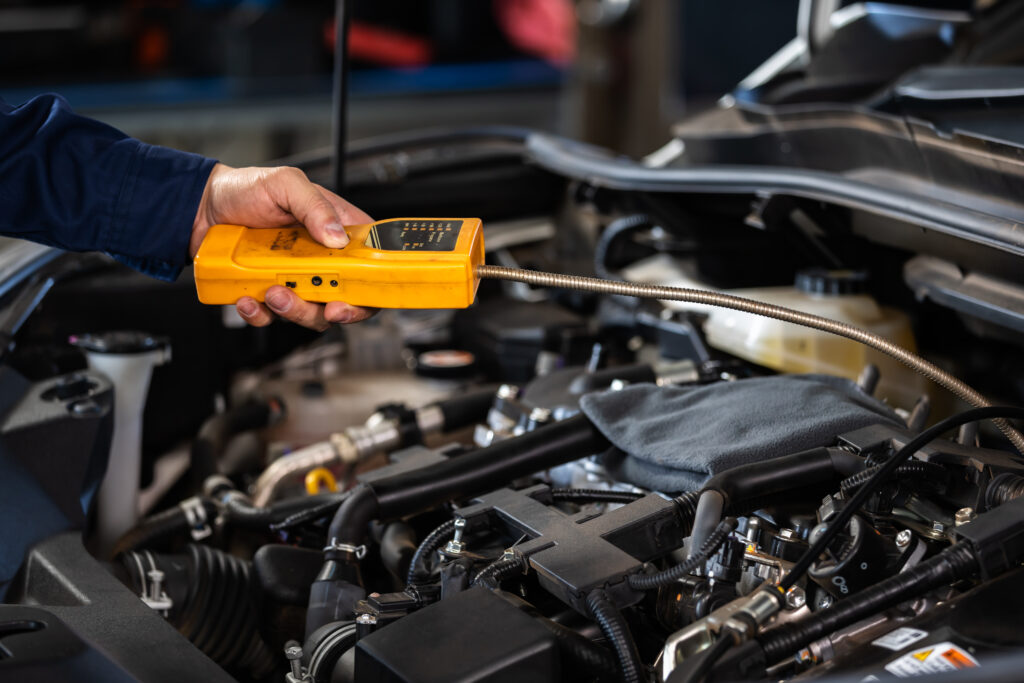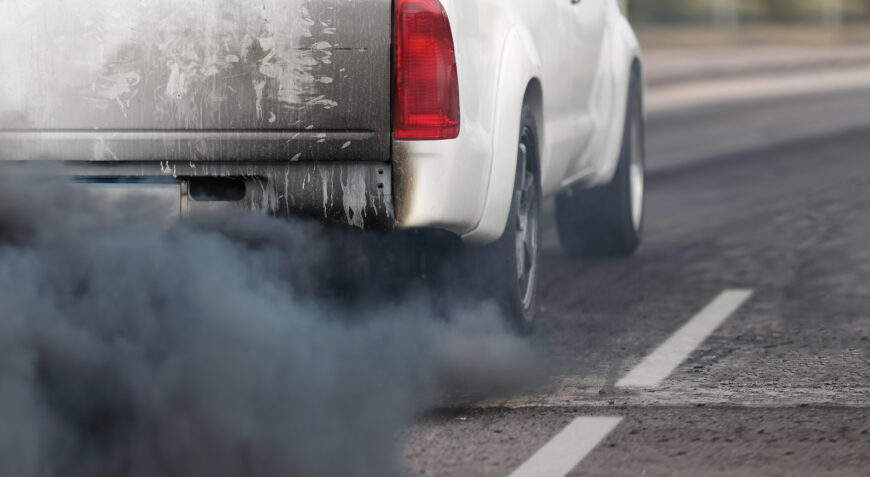Noticing strange smoke from your exhaust? While it may be tempting to push it out of your mind and hope it goes away, smoke isn’t usually something to ignore — it’s your car trying to tell you something. While some smoke may be relatively harmless, others can indicate serious issues that need attention right away. These can be more easily determined by specific colors and amounts of smoke.
To better understand the different exhaust smoke colors and causes, use this guide to help you assess what’s happening under the hood so you can get your car back on the road quickly.
Understanding Different Exhaust Smoke Colors
White Smoke
Causes
White smoke often indicates a coolant leak in the engine’s combustion chamber. This can be caused by a number of reasons, such as a blown head gasket, a cracked engine block or damaged cylinder heads. Persistent white smoke usually signals a serious issue that needs attention as soon as possible.
Potential Damage
If left unchecked, coolant leaks can lead to overheating and severe engine damage. Coolant in the combustion chamber can cause corrosion, reduce engine performance and damage components like cylinder heads and the engine block. Ignoring persistent white smoke may eventually result in costly repairs, including cylinder head replacement or extensive engine work.
Solution
Addressing white smoke issues requires thorough diagnostics and repairs that keep your engine protected and performing at its best. At Apex Automotive, we offer expert services to help with these issues:
- Cooling System Inspection: Our technicians thoroughly inspect the cooling system, including the radiator, hoses and connections, to locate any coolant leaks.
- Leak Detection Tests: We use specialized tests to check for coolant leaks within the combustion chamber, helping us pinpoint the exact source of the issue.
- Targeted Repairs: Once we identify the cause, we perform necessary repairs, such as replacing gaskets, repairing cracks or addressing any faulty components, to prevent further coolant leakage.
- Engine Protection and Longevity: Early detection of coolant leaks leads to less engine wear, reduced risk of overheating and a smoother ride for years to come.
Protect your engine from avoidable damage with routine maintenance to help it last longer and perform at peak levels.
Blue Smoke
Causes
Blue smoke is a classic sign that your engine is burning oil. When oil slips past worn valve seals or piston rings and enters the combustion chamber, it ignites along with fuel, resulting in your car blowing out blue smoke.
Potential Damage
Prolonged exposure to burning oil can lead to severe engine issues and reduced fuel efficiency, ultimately causing costly repairs if ignored. Over time, the excessive burning of oil can damage critical components like the catalytic converter and spark plugs, resulting in significant wear on the piston rings and cylinder walls. If these issues escalate, they could need an engine rebuild or even a full replacement, which can be a major expense for car owners.
Solution
To address this, have comprehensive diagnostics performed to help prevent further engine damage and keep your vehicle running smoothly. Here’s what you can expect from our team at Apex Automotive should you choose us to service your vehicle:
- Thorough Inspection: Our technicians carefully examine critical engine parts like valve seals, piston rings and the combustion chamber to locate the exact source of the oil leak.
- Targeted Repairs: Once we pinpoint the issue, we perform specific repairs to stop the oil leak and prevent more oil from entering the combustion chamber.
- Performance and Efficiency: Addressing oil leaks early improves your car’s fuel efficiency and reduces strain on essential engine components.
- Protection Against Costly Repairs: Sealing oil leaks promptly can prevent damage to vital parts like the catalytic converter and spark plugs, helping you avoid major repair bills down the road.
With Apex Automotive’s expert diagnostics and repairs, you’re protecting your engine from unnecessary wear and damage, keeping it in optimal condition and running smoothly for the long haul.
Black Smoke
Causes
Black smoke is typically a sign of a fuel system problem. This can occur due to a clogged air filter, a malfunctioning fuel injector or an overly rich fuel mixture, all of which disrupt the balance in the air-to-fuel ratio.
Potential Damage
An imbalanced air-to-fuel ratio can lead to poor fuel economy, increased emissions and extra stress on engine components. When too much fuel enters the engine, it can lead to carbon buildup inside the combustion chamber and on parts like spark plugs. A fouled spark plug — one coated in carbon deposits — can’t ignite the fuel properly, causing misfires, reduced engine performance and inefficient fuel use. If left unresolved, these issues can result in costly repairs or replacements for parts affected by the excess fuel.
Solutions
Resolving black smoke issues calls for a detailed fuel-system inspection and targeted repairs to restore optimal performance. At Apex Automotive, we can perform:
- Fuel System Inspection: Our technicians carefully examine fuel injectors, air filters and other components to identify any blockages or malfunctioning parts affecting the fuel mixture.
- Air Filter Replacement: If a clogged air filter is the culprit, we replace it to ensure your engine receives a proper balance of air for efficient combustion.
- Fuel Mixture Adjustment: We make precise adjustments to the fuel mixture, restoring the correct air-to-fuel ratio and improving overall fuel efficiency.
- Performance and Efficiency Enhancement: Proper fuel system adjustments not only stop black smoke but also improve fuel economy, lower emissions and extend the life of critical engine components.
By addressing the root causes of black smoke, you protect your engine’s health and prevent costly repairs, keeping your vehicle running smoothly and efficiently.
Gray Smoke
Causes
Gray smoke can be a bit tricky to diagnose, as it may result from various issues. It’s often linked to problems with the exhaust system or a leak in the transmission fluid that finds its way into the engine. In some cases, gray smoke could also indicate burning oil.
Potential Damage
If gray smoke stems from transmission fluid or oil burning, it can lead to reduced engine performance, increased emissions and wear on engine components. Prolonged exposure to these issues can damage parts like the exhaust system and catalytic converter or even lead to engine overheating, potentially resulting in costly repairs.
Solution
Gray smoke requires a careful and thorough diagnostic process to determine the exact source. Here’s what we offer to address it:
- Exhaust and Transmission Inspection: Our technicians inspect both the exhaust and transmission systems to identify potential leaks or other issues that may be causing the gray smoke.
- Leak Detection Tests: We use advanced methods to pinpoint any leaks in the system, such as transmission fluid entering the engine or exhaust leaks contributing to gray smoke.
- Precise Repairs: Once we identify the root cause, we perform the necessary repairs to resolve leaks, replace damaged parts and prevent further issues.
- Restored Performance and Efficiency: Early detection and repair of gray smoke issues protect essential engine components, restore optimal performance and keep emissions under control.
With our expert diagnostics and repair solutions, you can be confident that your engine is safeguarded from damage, enhancing its reliability and efficiency on the road.

Additional Factors to Consider
There are other factors to be aware of that may contribute to your vehicle’s production of smoke. Here is one important one to take into consideration:
Diesel Engine Specifics
Diesel engines can produce different smoke colors compared to gasoline engines. For example, black smoke might be more common in diesel engines due to particulate matter, but excessive black smoke may still indicate clogged fuel injectors or a problem with the air-fuel mix.
Why You Might See White Smoke on Cold Mornings
Sometimes, you’ll see white smoke on those cold early mornings, but if it’s only temporary, it’s likely just water vapor. If it sticks around, though, that’s when it could be a sign of something more.
When To Seek Immediate Help
If you’re seeing thick, constant or unusually colored smoke from your exhaust, it’s time to call your nearest experts. These issues can quickly escalate, turning a simple fix into an expensive repair. Getting a diagnostic early can save you from bigger hassles and cash down the line.
Schedule an appointment at Apex Automotive today to help diagnose and fix your car’s smoke issues so you can stay safe on the road.
Proactive Maintenance and Prevention
The best chance of preventing problems is through proactive maintenance over time. Here are some ways to do that:
Regular Diagnostics
Routine checks can often catch problems before they show up as visible smoke. Apex Automotive offers comprehensive diagnostics to identify potential issues early, helping your vehicle run smoothly and reliably.
Tailored Maintenance Plans
Exhaust smoke doesn’t have to mean trouble if you stay on top of regular maintenance. With Apex Automotive’s maintenance plans, we address the root causes of common smoke issues, from oil leaks to fuel system irregularities.
Prevention Tips
To keep your exhaust and engine systems in good shape, try these simple maintenance checks:
- Check Oil Levels Regularly: Low oil levels can lead to burning oil, which often shows up as blue smoke. Check your dipstick at least once a month and top up if it’s low. Regular oil changes also help prevent excess oil burn.
- Replace Filters Regularly: A clogged air filter throws off your fuel-to-air ratio, causing black smoke and poor fuel efficiency. Aim to check and replace air filters every 12,000–15,000 miles or as recommended by your vehicle’s manual.
- Inspect Coolant Levels: Low coolant could point to a leak, often leading to persistent white smoke. Check your engine coolant reservoir once a month, especially before long drives, and make sure it’s topped up to the correct level. If levels keep dropping, it’s a sign there may be a leak that needs professional attention.
Get Ahead of Costly Repairs
Your car’s exhaust smoke could be a small fix or a serious issue just waiting to happen. Don’t leave it to chance. Strange smoke colors are your car’s way of signaling it needs attention now to keep running smoothly and safely.
Schedule an appointment with Apex Automotive today, and let’s tackle the issue together before it becomes a bigger problem. Get back on the road knowing your car is in top shape!


